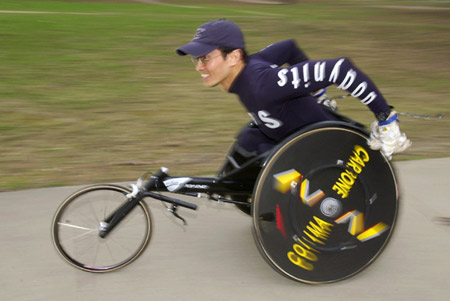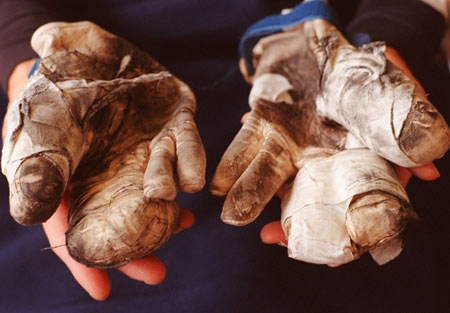Marathon man speeds help to others
SPH student to scale Heartbreak Hill to benefit children

William Tan has miles to go before he rests.
Twenty-six miles, roughly, in this year’s Boston Marathon. Tan, a wheelchair athlete and student at the School of Public Health, has made something of a career of raising money for worthy causes with the sweat of his brow and the blisters on his hands.
Since his first nonstop 16-hour marathon to raise money for kidney disease in 1987, Tan has performed some remarkable feats, such as traveling the lengths of Malaysia and New Zealand, competing in the 1988 Paralympics in Seoul, and finishing 20 marathons.
This year, Tan, who is working on a master’s degree in environmental and occupational health as a Fulbright Scholar, has been accepted as one of just 46 wheelchair athletes in the marathon; he hopes to finish in less than the two-hour qualifying time.
“The Boston Marathon, to many runners and wheelchair athletes, is the ultimate,” Tan said. “It’s one of the first, the most famous and toughest in the world … . It gives me butterflies in my stomach to think about Heartbreak Hill.”
A stop a half-mile from the finish may slow Tan down, but it’s an important stop. At that point, Tan said he will switch from his racing wheelchair to a regular one, and sit little Jessica Doktor, a 3-year-old Children’s Hospital leukemia patient, on his lap for the final stretch to the finish line.
Tan is dedicating his efforts in this year’s marathon to Children’s Hospital, raising money as part of Children’s Kids at Heart Marathon Team.
“The causes of children are very close to my heart,” said Tan. “Growing up … with a disability has brought me very close to children [going through similar experiences].”
Polio despite vaccine
Tan, who grew up in Singapore, lost the use of his legs after coming down with polio when he was 2 years old. He hadn’t been immunized even though the oral polio vaccine was widely available. After having to be home so much during Tan’s illness, his father lost his job as a clerk and began selling banana fritters out of a wheeled cart.
The family was poor and couldn’t afford a wheelchair, Tan said, so he crawled around on the floor when he was in the family home and was carried piggyback by a family member when they went outside.
Despite the family’s poverty, Tan’s mother had a strong belief in education and insisted that Tan attend mainstream kindergarten classes when he was old enough to attend school. That experience ended in disaster, Tan said, when he was expelled for biting classmates after they repeatedly slapped him on the head and ran away.
After being schooled at home for the rest of the year, Tan got another chance to return to school. He made the most of it, graduating at the head of his first-grade class. Tan had continued success at school, though it was still years until he learned to walk with crutches and knee braces.

“As a child, it was a revelation to me that I had to make my life count so all my father’s efforts wouldn’t be in vain,” Tan said.
He first experienced a wheelchair in high school when he met a policeman who had been shot in the spine. Tan said he had never experienced anything like it.
“It was a transforming event for me because I had never felt the sense of speed before,” Tan said. “I felt the wind going against my hair and on my eyes. It gave me an instant love of sports.”
Determination to help others
Tan began to race competitively, doing well in regional and national games for wheelchair athletes. The Seoul Paralympics were an eye-opener for him, he said, as he learned new techniques to push the chair, and saw the new chairs that were being made. His own chair, made in a friend’s garage, didn’t roll straight, getting him disqualified in two events for lane violations.
Though he competed in Seoul and has wanted to compete in subsequent Paralympics, he hasn’t yet returned. Though he qualified for several other games, personal events kept him away. To get to his current position as a medical researcher, Tan also had to apply himself to his studies and his work, including a stint as a postdoctoral researcher at the Mayo Clinic in 1995.
Tan’s first fundraiser came in 1987, when, after hearing about poor patients with kidney disease dying at home because they couldn’t afford dialysis, he circled the track at his former high school for 16 hours to raise money to begin a fund for treatment for those who couldn’t afford it. He took in $63,000.
Since then, in a wide variety of races and fundraisers, Tan said he has raised $11 million for various charities, helping establish two professorships one in health sciences and one in geriatrics at the National University of Singapore. In his softspoken way, Tan said it would be wrong to attribute raising the money entirely to him, as donors, event organizers, support people, and many others contribute to his efforts.
‘Pretty inspirational’
When Tan arrived in the United States last year, he contacted Children’s Hospital to see if he could help raise money for needy children. They told him about their marathon team and paired him with Jessica, with whom he’s bonded through visits at the hospital and to her home
Jessica’s mother, Gail Doktor, said the family has been inspired by Tan, saying they share the mission of raising awareness of children’s illnesses.
“He reminds us that the community that cares about children go beyond the families themselves,” Doktor said. “He cares about Jessie. He cares about the other kids and he relates to them. He’s a hero to us.”
Tan, who stays in shape through one and a half to two hours of aerobic exercise, 400 push-ups, and 200 chin-ups a day, is one of 121 individuals raising money for Children’s Hospital during the marathon, according to Megan Trask, Marathon coordinator for the Children’s Hospital Trust.
“He’s a pretty inspirational guy,” Trask said. “We believe he’s the first wheelchair participant participating on behalf of a charity. It’s pretty exciting for us.”
Tan said he’d heard of Children’s Hospital even before coming to the United States. He said Children’s is well known for its efforts on behalf of children, both in America and internationally.
For the Boston Marathon, Tan has set a goal of raising $10,000 for Children’s. At the same time, he is using the marathon as a platform to raise money for a separate fund at the KK Children’s Hospital in Singapore for children from all over Asia who need complex surgeries.
After the marathon, Tan will return to his studies. After graduating, he plans to return to Singapore and incorporate work on cancer prevention and public health policy-making into his work as a researcher.
And he also has his eye on the 2004 Paralympics in Athens, Greece.
“I always tell myself not to bow down before adversities but to redefine what is humanly possible,” Tan said.




